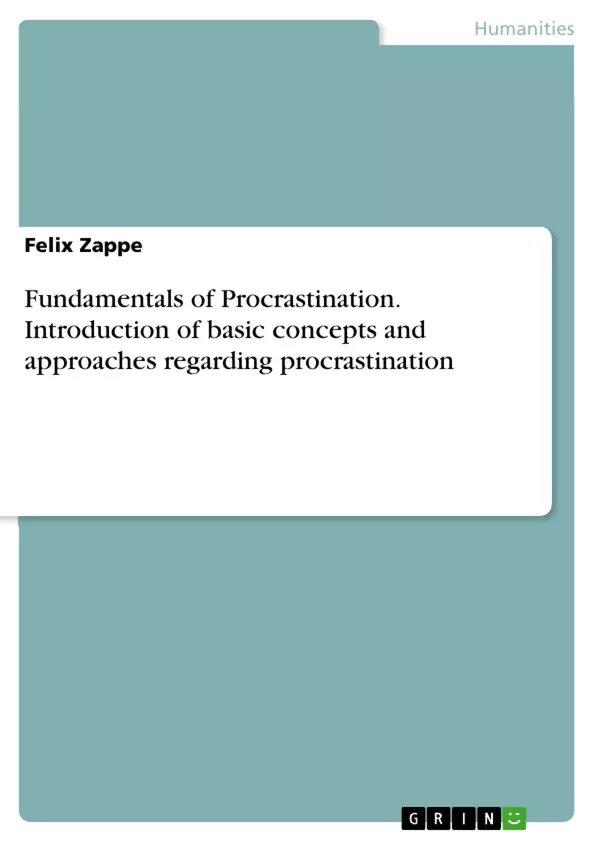The term procrastination is nowadays rather widespread even in popular culture and media. The term is defined as the tendency to delay the beginning or the completion of an action beyond a time so that the successful accomplishment of the task is hardly possible and the postponement results in discomfort (Solomon and Rothblum, 1984; Steel, 2007).
It is possible to discriminate between different kinds of procrastinators, as the underlying mechanics differ. The several types of procrastination are (Rückert, 2014):
[...]
Inhaltsverzeichnis (Table of Contents)
- Fundamentals of Procrastination
- Tables and Figures
- References
Zielsetzung und Themenschwerpunkte (Objectives and Key Themes)
This document provides a fundamental understanding of procrastination by introducing basic concepts and approaches related to the phenomenon. The aim is to analyze various types of procrastination and explore the underlying mechanics behind them. It also examines the factors that influence procrastination and its impact on performance, well-being, and task completion.
- Different types of procrastination and their underlying mechanisms
- The dynamic model of procrastination and its key factors
- The influence of procrastination on performance, well-being, and task completion
- Situational factors that moderate procrastination
- The role of self-efficacy and fear of failure in procrastination
Zusammenfassung der Kapitel (Chapter Summaries)
The first chapter provides a comprehensive definition of procrastination and explores various types of procrastinators, including arousal procrastination and avoidance procrastination. It further differentiates between trait-procrastination, state-procrastination, and fatal procrastination. Chapter two introduces the dynamic model of procrastination, emphasizing the interplay of process focus, aversion of means, fear of failure, and self-efficacy in determining procrastination behavior. The model also highlights the impact of procrastination on task completion, well-being, and performance.
Schlüsselwörter (Keywords)
Procrastination, arousal procrastination, avoidance procrastination, trait-procrastination, state-procrastination, fatal procrastination, dynamic procrastination model, process focus, aversion of means, fear of failure, self-efficacy, task completion, well-being, performance.
Frequently Asked Questions
What is the definition of procrastination?
Procrastination is defined as the tendency to delay the beginning or completion of an action to the point where successful accomplishment is difficult, often resulting in personal discomfort.
What are the different types of procrastinators?
The document distinguishes between several types, including arousal procrastinators (who seek the thrill of the deadline) and avoidance procrastinators (who fear failure).
What is the difference between trait and state procrastination?
Trait procrastination is a stable personality characteristic, while state procrastination refers to the behavior of delaying tasks in specific situations.
How does procrastination affect performance and well-being?
Procrastination negatively impacts task completion and quality of performance, while also leading to increased stress, guilt, and reduced overall well-being.
What factors are included in the dynamic model of procrastination?
The model emphasizes factors like process focus, aversion to the means, fear of failure, and the individual's level of self-efficacy.
Why is self-efficacy important in understanding procrastination?
Self-efficacy, or the belief in one's ability to succeed, acts as a crucial determinant; low self-efficacy often leads to avoidance and delay of challenging tasks.
- Quote paper
- Felix Zappe (Author), 2017, Fundamentals of Procrastination. Introduction of basic concepts and approaches regarding procrastination, Munich, GRIN Verlag, https://www.grin.com/document/358402



